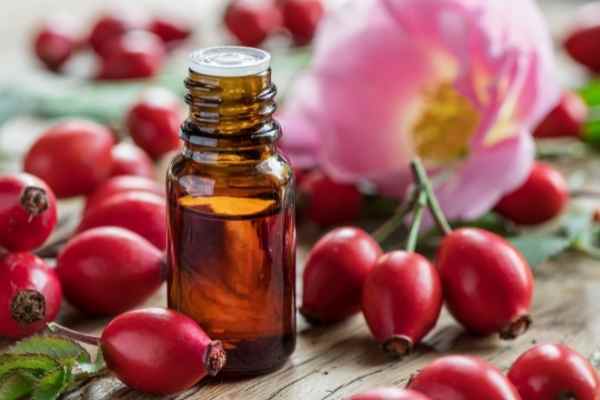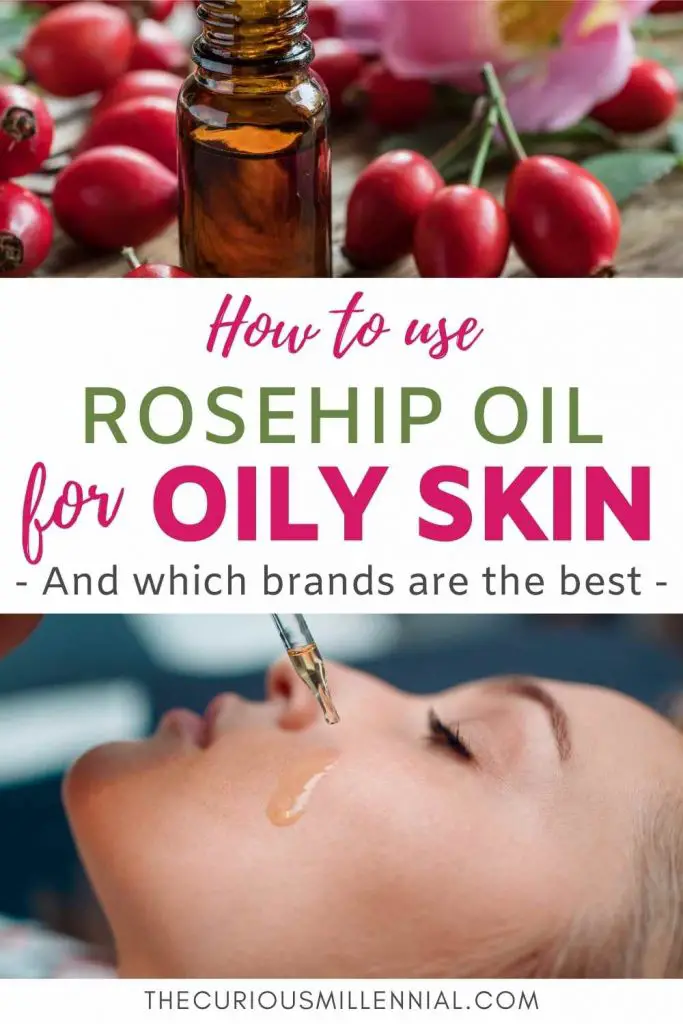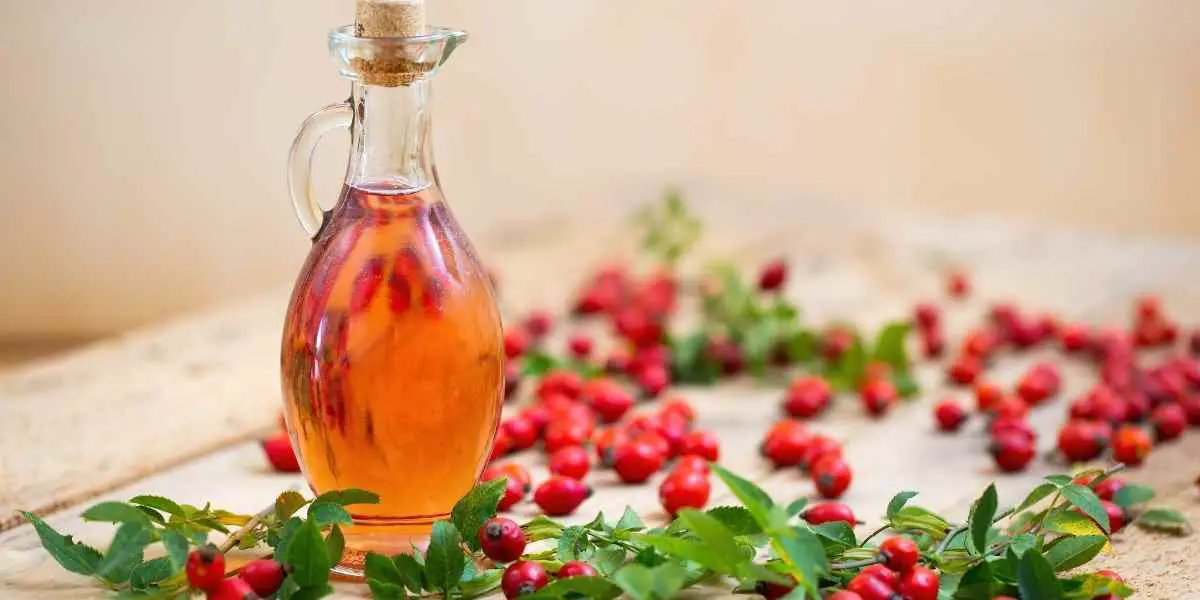Is rosehip oil good for oily skin? Yes. It is a very lightweight oil. So when you put it on your skin, it’s not one of those oils that you have to blot off afterward. It absorbs right into the skin, so you put it on, let it absorb into the skin for about two minutes and you’re done.
The importance of skin care cannot be understated. The skin is the largest organ in the body, and it needs to look and feel good.
Today, I just want to concentrate on a particular product I use in my skincare routine for oily skin. The product is rosehip oil.
It is like liquid gold in a bottle. I have been using this particular oil for probably about a month, maybe a month and a half.
Before understanding the benefits of rosehip oil, and how to use it for oily skin, let’s see what type of oils are good for oily skin.
Should I Use Face Oil If I Have Oily Skin?
There are two essential fatty acids (EFAs) that have been shown to be involved in the clogging of the blood vessels.
Oils rich in linoleic acid have been shown to be more effective for oily skin. They help in retaining the moisture into the skin and do not clog pores.
That’s really critical for oily skin girls like me. Because we don’t want to put things on our skin that is going to add to our oily skin condition.
OILS BEST SUITED FOR OILY SKIN – Oily skin types tend to shy away from using oils in their routine for fear of looking way too shiny but oils are great addition to a skincare routine.. BREAKING NEWS #BBNaijaHighlights Obafemi Martins Terri Miyetti Allah pic.twitter.com/t19wjBWjsn
— Skincare Hub | Made By Maj Beauty (@MBMBSkin) March 2, 2021
Oils rich in oleic acid have been shown to be more effective for dry skin. They are oilier in texture and can clog the pores of people with oily skin.
Now that we know what oils we can use in our skincare, let’s take a look at what rosehip oil is.
What Is Rosehip Oil?
“Rosehip oil is extracted from the seeds of wild rose bushes,” says NYC-based cosmetic dermatologist, Sejal Shah, MD, FAAD.
It is also known as rose oil, rose seed oil, or rosehip seed oil. The oil, extracted from the seeds and fruit of the rose, is a good source of vitamins A and E.
Rosehip oil has been used for thousands of years as a tonic for the skin, and its benefits are numerous.
The oil contains vitamins, antioxidants, and essential fatty acids. It is often used as a moisturizer and emollient.
Rosehip oil has been used for thousands of years by Native Americans and civilizations such as the ancient Egyptians.
Is Rosehip Oil Good For Oily Acne-Prone Skin?

When we have oily skin, it’s because our sebum production is too much.
People with oily skin often use alcohol-based products and scrub their skin way too hard to get rid of this excess sebum. As a result, their skin becomes dull and produces even more oil.
Oily skin is often lacking in linolenic acids. These essential fatty acids are essential for the proper functioning of the skin. They also help to keep the skin soft and supple. Rosehip oil is rich in these essential fatty acids and can be used to treat the deficiency of linoleic acid.
Rosehip oil absorbs really well into the skin and helps to keep the skin moisturized. If you have oily skin like me, please do not skip your moisturizer. It’s, still really important to use a moisturizer on the skin, and rosehip oil is a great option for you.
It is full of omega-3s, omega-6s, and omega 9s, and also beta carotene and vitamins. There are countless benefits to this particular oil for oily skin that you don’t get in other essential oils –
- Contains linoleic acid that helps to lock in the moisture and keeps irritants away.
- Includes retinoids that help in collagen production.
- Rich in fatty lipids and ascorbic acid, they brighten the skin and maintain its texture.
- Serves as an antioxidant that fights against free-radicals.
So it’s really beneficial and works on the skin from a deep tissue level, hence regenerating those tissues. You know as we get older, our skin tends to become dull and that’s because our skin is not regenerating the way it did when we were younger.
Because of all these benefits to the skin, rosehip oil helps you keep a nice healthy, looking glowing skin and it helps you to better manage the elasticity of your skin as well.
Is Rosehip Oil Comedogenic?
If you’re concerned about clogging pores, this will not do that. Rosehip oil has a comedogenic rating of 1 (it is a non-comedogenic oil).
Other Skin Benefits
Aside from its oil-fighting properties, rosehip oil also has other skin benefits –
- It moisturizes the skin
- It hydrates the skin
- It helps in brightening the skin
- It helps in collagen production
- It reduces hyperpigmentation
- It reduces acne scars and wrinkles
- It reduces inflammation
- It protects the skin against the sun damage
Side Effects Of Rosehip Oil
Rosehip oil has been used for thousands of years and is generally considered to be a safe and effective skincare ingredient. However, it is best to test the oil on a small part of your skin before you use it.
How To Use Rosehip Oil For Oily Skin

You can use rosehip oil directly on the skin without diluting it. Rub your hands together and apply the oil to your skin. You can also use rosehip oil as a spot treatment for acne. Make sure that the oil you use is 100% rosehip oil.
Rosehip seed oil is a very gentle oil that can be used as a moisturizer twice a day. If you are using rosehip seed oil as a moisturizer, make sure to test it on your skin before using it all over your body. If you experience any irritation, do not use more of it.
Rosehip Seed Oil Facial Moisturizer Recipe
Ingredients
- 1 tablespoon Evening primrose oil
- 1 tablespoon Rosehip seed oil
- 15 drops Lavender essential oil
- 5 drops Rose essential oil
Mix the ingredients together and use as a daily moisturizer for oily skin.
Both rosehip seed oil and evening primrose seed oil can be used as a carrier oil for skincare products.
Rosehip seed oil nourishes the skin and evening primrose seed oil contains linoleic acid, which helps the skin to produce excessive sebum.
Rose essential oil and lavender essential oil are two of the best oils for oily skin.
Argan And Rosehip Seed Oil Moisturizer Recipe
Ingredients
- 1 tablespoon argan oil
- 2 teaspoon rosehip oil
- 10 drops of lavender or carrot seed oil. You can use any other moisturizing oil as well.
Instructions
- Add all of the essential oils in a small jar or bottle. Then, shake the mixture to mix the oils well.
- Use as a daily moisturizer for oily skin.
Things To Look For When Buying The Best Rosehip Oil For Oily Skin
The rosehip seed oil has been used for thousands of years for its healing properties. But the quality of the oil really matters if you want to get all the benefits of this oil. These are a few things you should look for when choosing the best rosehip oil for oily skin –
Color – The conventionally grown rosehip seed oil has a very pale yellow color and has low levels of essential fatty acids, vitamins, and minerals.
Sources – Organic rosehip seed oil has a much more intense orange color than other seed oils. It also has more vitamin A and carotenoids.
Organic Rosehip Oil is usually obtained from the wild rose bushes and is rich in essential fatty acids, vitamins, and antioxidants. It is important to note that the label will usually state that the oil is organically grown.
Production method -Look for cold-pressed rosehip oil. The cold pressing method minimizes the amount of heat that needs to be applied during the extraction process and is the best-known way to extract essential oils.
On the contrary, the expeller pressed oils, which produce at a higher temperature, lose their vitamin and nutritive value.
Best Rosehip Oils For Oily Skin
- Teddie Organics Rosehip Seed Oil
- Aria Starr Rosehip Seed Oil Cold Pressed For Face, Skin, Acne Scars
- Majestic Pure Rosehip Oil for Face, Nails, Hair, and Skin
- Radha Beauty USDA Certified Organic Rosehip Oil
- Rosehip Seed Oil by Kate Blanc
When To Use Rosehip Oil In Skincare Routine?
If you have oily skin, you can use rosehip oil in your skincare routine both morning and night. Just add a few drops of oil to your cleansed face and massage it in. You can also add rosehip oil to your favorite moisturizer or serum for an extra boost of hydration.
How Often Should You Use Rosehip Oil?
For best results, use rosehip oil every day. Remember to always perform a patch test before using any new product on your skin.
Is Rosehip Oil Good For Combination Skin?
Rosehip oil is also good for combination skin. If your skin is on the drier side, you can use rosehip oil more often. For example, you can use it twice a day or even add it to your nightly moisturizer.
On the other hand, if your skin leans more towards the oily side, you can use rosehip oil less often. Once a day should be enough to help control excess oil and improve the overall appearance of your skin.
Which Oil Is Best For Oily Acne-Prone Skin?
There are many different oils that are good for oily, acne-prone skin. However, some of the best options include jojoba oil, grapeseed oil, and rosehip oil. These oils are all non-comedogenic and can help to control excess sebum production.
What Oils Are Bad For Oily Skin?
There are some oils that can actually make oily skin worse. These include coconut oil, avocado oil, and cocoa butter. These oils are all comedogenic, meaning they can clog your pores and lead to breakouts.
The Bottom Line
So, is rosehip good for oily skin? Rosehip oil is an excellent choice for oily skin.
You can easily find rosehip essential oil in the health food section of your local grocery store or health food store. Look for products that have been made by a reputable company. Always follow the directions given to you by the manufacturer.
It may take a few weeks to start seeing results from using topical rosehip oil.
If you are not seeing the results you want from your treatment, speak with your doctor about trying a different approach. Your doctor will be in a position to advise you on the best way to proceed.
Here are some other good ingredients for oily skincare.

